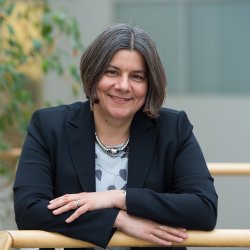Surrey wins £3.56m Expanding Excellence in England award for intelligent integration of human and machine research
Research England has awarded Surrey's Centre for Translation Studies (CTS) a £3.56m Expanding Excellence in England grant to fund a pioneering three-year expansion and research programme, bringing together traditional human-based research practices with cutting-edge advances in artificial intelligence (AI)

The language services sector is an enabler of worldwide business and communication, pivotal to the consumption of foreign products, services and information in a globalised economy, with society intricately affected by how translation and interpreting services are designed and delivered.
As human practices of translation and interpreting are increasingly supported, enhanced and sometimes replaced by technology, CTS’s vision is to create an interdisciplinary research centre for multilingual communication by combining human, technology-enhanced and automated approaches (AI) to resolve a range of translation and interpreting problems.
Research is critical at a time when increasing automation is reshaping the language services sector into one of the fastest growing industries, nationally and globally. This ‘technological turn’ in translation creates exciting opportunities, but it also requires fresh approaches in order to understand all the dimensions of its impact, mitigate drawbacks and derive truly innovative solutions. CTS will combine its excellence in researching applications of technologies with complementary expertise in natural language processing, machine learning and artificial intelligence to initiate a step-change in the broader research agenda.
Director of the Centre for Translation Studies Professor Sabine Braun said: “Automation is rapidly transforming the language services landscape, shifting industry practice and the research agenda in the direction of technological innovation. To harness the full potential of the AI revolution in this field, we will focus on the convergence of human and automated approaches to different modes of translation and interpreting, including modes that improve the inclusion of diverse and marginalised groups in society, to create an ambitious and far-reaching research programme.”
This funding will allow the team to focus on innovative research into the social, ethical and economic consequences of automation in translation, and into the implications for the design and regulation of automated solutions. Rapid advances in automation have increased accessibility for diverse groups, but critical problems of machine translation remain and have fuelled a discourse where humans and machines are seen as opposing forces. CTS’ research will contribute to the development of robust technology-supported solutions for partners including public sector agencies (e.g. in legal, medical and migration contexts), promoting the intelligent integration of human and machine.
Universities and Science Minister Chris Skidmore said: “Pushing the boundaries of knowledge and conquering new innovations are what our universities are known for the world over. This programme led by the University of Surrey will help make automated services available for people from all over the world, responding to different languages.
“The Expanding Excellence in England Fund will support projects throughout England to master new and developing areas of research and industry. Made possible through our record R&D spend delivered by our modern Industrial Strategy, the investment will support researchers to develop solutions and opportunities for UK researchers and businesses.”
Featured Academics
Media Contacts
External Communications and PR team
Phone: +44 (0)1483 684380 / 688914 / 684378
Email: mediarelations@surrey.ac.uk
Out of hours: +44 (0)7773 479911
